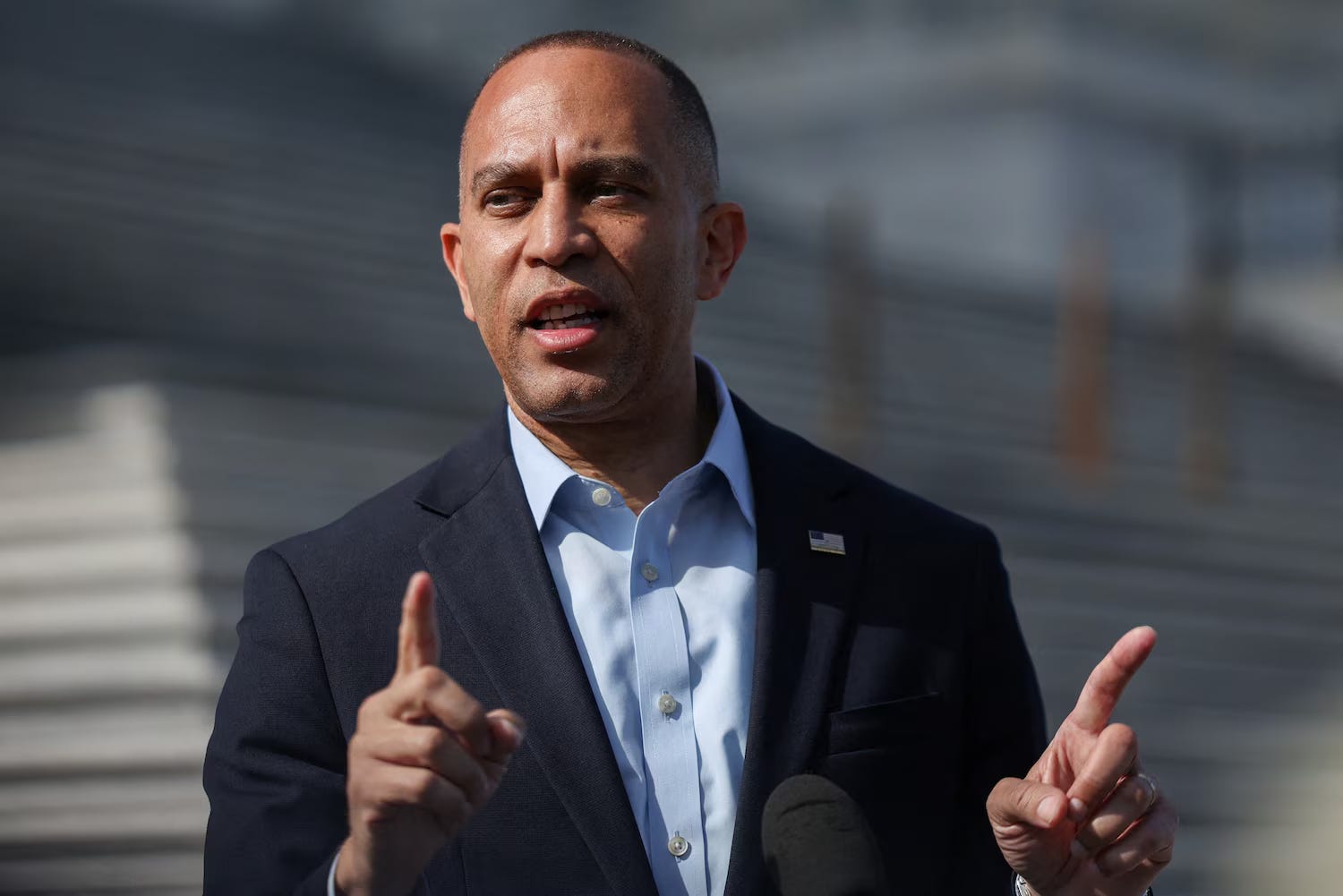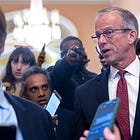SNAP, troop pay and air travel test Democrats’ health care message
Plus: The Senate rebukes Trump’s Brazil tariffs and Illinois proposes new 2026 map.

● ○ ○ ○ ○ ○
👋🏾 Hi, hey, hello! It’s Wednesday morning—Day 29 of the government shutdown and six away from the longest in American history. The House has not voted in 40 days.
The Senate Indian Affairs Committee will hold a hearing this afternoon to examine the impacts of the shutdown and agency reductions-in-force on Native communities. Sen. Lisa Murkowski (R-Alaska) chairs the panel while Sen. Brian Schatz (D-Hawaii) serves as its ranking member.
A House Democratic staffer told me that aides expect the shutdown to extend to mid- to late-November when the House-passed continuing resolution expires. (Related: The Senate failed for the 13th time on Tuesday morning to advance the CR.)
The source also noted that if the shutdown doesn’t end this week, it will be the first time in history that House employees won’t get paid on time. I called the Office of the House Historian to confirm, but the office is closed due to the funding lapse. Senate staffers, who are paid on a different schedule than House staffers, have already missed two paychecks.
I’m told members and staffers will start to receive previews of their health insurance premiums for the upcoming year. It will be interesting to see if and how their own insurance estimates will factor into the legislative strategy, since the expiration of the enhanced Affordable Care Act premium tax credits is what the shutdown is over.
But the focus this week has been more on the impending SNAP cliff when 42 million Americans risk losing access to food aid unless the Trump administration intervenes, the suffering of the air-traffic controllers who missed their first full paycheck on Tuesday and the legality of Trump’s usage of private donations to pay military service members—visceral storylines that risk accelerating a narrative drift from Democrats’ preferred issues of health care, affordability and extending the Affordable Care a Act premium tax subsidies.
House Minority Leader Hakeem Jeffries (D-N.Y.) pushed back against the notion that his members’ policy demands were limited to health care.
“As we set out from the very beginning in September, we wanted to reach a spending agreement that’s bipartisan, that meets the needs of the American people in three areas—their health, their safety and their economic well-being. And that, of course, includes making sure that they can put food on the table in the wealthiest country in the history of the world,” Jeffries told me. “Donald Trump and Republicans have launched an all-out assault on the American people from the very beginning of this presidency, and it’s cruel and it’s punitive, and it’s hurting everyday Americans.”
Jeffries added that House Republicans have aggravated the situation by remaining on recess since Speaker Johnson has canceled votes for five consecutive weeks.
“We’re just going to continue to urge them to come to the negotiating table so we can reach the type of bipartisan spending agreement that the American people deserve.”
Sen. Raphael Warnock (D-Ga.), who sits on the Senate Agriculture Committee, which oversees SNAP, said many of the same people who need food assistance also rely on the ACA for health care.
“It’s the Republicans who have all of these American citizens in the vice grip and they’re telling us to choose hostages,” he told me. “I’m fighting for all of them.”
But Senate Majority Leader John Thune (R-S.D.) seemed unsurprised that the conversation has shifted to the most urgent crises.
“It’s indicative of what happens in shutdowns. As time goes on, the consequences get worse for the American people. They get real and you’re starting to see that,” he said. “I think that’s why the messaging and the narrative on their side is shifting.”
He reiterated his hope that a handful of Senate Democrats will break ranks to join Republicans in supporting the House-passed CR, but acknowledged that Democrats have blocked every attempt to advance funding bills they supported in committee.
“At the end of the day, as this starts sinking in, becoming more real and the consequences more painful, hopefully they’ll come to their senses,” he told me. “It’s what I’ve been saying for a long time, as you all know.”
Senate Finance Committee Ranking Member Ron Wyden (D-Ore.) will host a press conference with liberal advocacy group Protect Our Care to mark 400 days since the Finance Committee held a health care policy hearing and to call on Republicans to join Democrats to lower health insurance premiums. (In addition to tax policy, the committee oversees public health programs, managing funding and regulations for Medicare and Medicaid while also addressing issues related to health care affordability and access.) FWIW, Thune told reporters he spoke with Trump last night and the president agreed to meet with Democrats next week to discuss the health care crisis—but only if Democrats provided the Senate votes to reopen the government.
Senate Minority Leader Chuck Schumer (D-N.Y.) told reporters that Senate Democrats would introduce a bill to ensure SNAP and WIC remain funded throughout the shutdown. Across the Capitol, House Assistant Minority Leader Joe Neguse (D-Colo.) will be joined by several House Democrats at a press conference on Wednesday afternoon to further highlight the SNAP funding cliff—and likely lapse—as a product of the Trump administration’s inaction.
A coalition of 23 states and the District of Columbia has filed suit in the U.S. District Court for the District of Massachusetts against the USDA and the Office of Management and Budget (OMB), alleging that USDA’s decision to suspend benefits for SNAP next month is “arbitrary and capricious” under the Administrative Procedure Act and violates the program’s statutory status as an “appropriated entitlement.”
The states argue that USDA directed states to hold issuance files even though contingency funds remain available—including a $3 billion reserve and unused Section 32 funds—and that the suspension will inflict irreparable harm on millions of residents who rely on monthly benefits.
○ ● ○ ○ ○ ○
The Senate passed a resolution on Tuesday evening to block President Trump’s tariffs on billions of dollars of goods from Brazil.
The legislation would terminate the July 30 emergency declaration and eliminate the tariffs on Brazilian imports implemented as a result.
The final vote was 52–48.
“The tariffs are bad, and this is one way to go after them, and it’s a way to put people on the record about whether they will stand up for their constituents or just kowtow to President Trump,” Sen. Tim Kaine (D-Va.), the lead sponsor of the resolution, told reporters this morning. “But even separate from the tariffs, this whole notion of a president governing by emergency power and trying to bypass everybody else in the system to do so is very dangerous.”
Five Republicans—Thom Tillis (N.C.), Rand Paul (Ky.), Susan Collins (Maine), Lisa Murkowski(Alaska) and Mitch McConnell (Ky.)—joined all Democrats in favor of the resolution.
“Tariffs make both building and buying in America more expensive,” he said ahead of the vote. “The economic harms of trade wars are not the exception to history, but the rule.”
The bill needed a simple majority to pass. Any one senator can challenge Trump’s use of IEEPA since the president cited the 1977 law in his declaration.
Americans import more than $40 billion annually from Brazil, including nearly $2 billion’s worth of coffee—a product that cannot be grown in the United States since it lacks the combination of mild temperatures, high altitude and consistent rainfall that is typically found in the “bean belt” around the equator.
Trade between the U.S. and Brazil supports nearly 130,000 American jobs, and the U.S. has a trade surplus with Brazil. A trade war with Brazil would raise costs for Americans, harm both the American and Brazilian economies and drive Brazil closer to China.
Despite the rare display of bipartisanship, the resolution won’t be taken up in the House after Speaker Johnson inserted a provision in a procedural measure earlier this year to prevent rank-and-file members from forcing a vote on tariff-related measures.
Kaine is expected to force votes this week to block the tariffs Trump levied on Canada and the global so-called “Liberation Day” tariffs the president announced in April.
The Supreme Court will hear the oral argument next Wednesday on whether IEEPA authorizes the tariffs imposed by Trump—and, if so, whether the statute unconstitutionally delegates legislative authority to the president.
○ ○ ● ○ ○ ○
Illinois submitted a proposed congressional map to state legislative leaders for consideration as Democrats look to blunt any gains Republicans hope to make in Texas, Missouri, North Carolina and Indiana.
Sources close to the situation say the new map could net Democrats an additional seat. Illinois’s current congressional delegation consists of 14 Democrats and three Republicans.
Those Democrats stated support for the map following its submission.
“It falls on the Land of Lincoln to counter an out-of-control Trump administration that is failing to lower costs, decimating the health care of the American people and attempting to deploy armed troops to our state,” the members wrote.
The Congressional Black Caucus’s political arm also expressed support for the proposed map.
“With the full moral weight of the Congressional Black Caucus, we join Illinois Democrats in support of a new map and urge state lawmakers to act with the fierce urgency of now—to defense our hard-won progres, protect the integrity of our democracy and preserve the voices of our communities,” CBC PAC Chair Gregory Meeks (D-N.Y.) said in a statement.
The proposed map would also preserve Black and Hispanic representation in key districts across the state, comply with the Voting Rights Act and keep together communities of interest, according to Democratic Congressional Campaign Committee Executive Director Julie Merz.
“It’s clear that Trump and Republicans are weaponizing mid-decade redistricting in order to prevent a check on their administration and the substantive damage they have already inflicted on the American people,” Merz said in a statement. “Our democracy is at stake, which is why Springfield must act with haste to preserve it.”
Jeffries spent Monday in Illinois lobbying state leaders to produce a new map and assuaging concerns about whether it would dilute Black and Latino representation.
○ ○ ○ ● ○ ○
Hurricane Melissa made landfall Tuesday afternoon near New Hope on Jamaica’s southwest coast as a catastrophic Category 5 storm with sustained winds estimated at 185 miles per hour and a central pressure of 892 millibars—tying it with the top three strongest Atlantic landfalls on record.
The storm is already wreaking havoc: Large swaths of the country are without power, widespread flooding and landslides have been reported in parishes such as St. Elizabeth, and authorities described wind speeds so extreme that even reinforced structures are being torn apart, with widespread damage reported across multiple parishes.
While Melissa has weakened slightly as it moves toward eastern Cuba, the Bahamas and possibly Bermuda, it remains an extremely dangerous major hurricane and regional authorities are bracing for further life-threatening impacts.
Congressional Black Caucus Chair Yvette Clarke (D-N.Y.), whose parents are Jamaican immigrants and spend significant time on the island country, acknowledged there will be loss of life and shelter and that she hoped the Trump administration would be there to assist in the recovery out of goodwill and without extortion.
“However, if past is prologue, I don’t anticipate that. We had our own U.S. [territory] Puerto Rico that faced a horrific hurricane [in 2017], and the response from the Trump administration at that time was horrific,” Clarke told me. “So I think that civil society has a role to play here. Jamaica has an extensive NGO network that can get to the people. The first 72 hours are going to be critical in the recovery.”
Clarke, who represents many of the estimated 62,200 Jamaican Americans who call Brooklyn home, joined Rep. Meeks, the top Democrat on the House Foreign Affairs Committee, and Joaquin Castro (Texas), who serves as ranking member of the panel’s Western Hemisphere Subcommitee, in a statement this week calling on the State Department to deploy disaster relief to Jamaica and the surrounding areas swiftly.
The top House Democrat echoed their sentiment.
“We’re praying for the people of Jamaica and all those who have loved ones on the island nation of Jamaica, including many people that both Congresswoman Yvette Clarke, Congressman Greg Meeks and myself are privileged to represent,” Hakeem Jeffries told me. “We are going to make sure that we push the administration to mobilize resources and surge them to Jamaica in the immediate aftermath of this terrible hurricane.”
○ ○ ○ ○ ● ○
Sen. Elissa Slotkin (D-Mich.) will speak at the Brookings Institute this afternoon on President Trump’s use of the military, use of force and what she describes as his authoritarian playbook—and how it all impacts American democracy.
In recent months, President Trump has dramatically expanded the use of military and federal forces—both overseas and domestically—in actions that carry significant implications for democratic norms.
Overseas, he has declared the country to be in a “non-international armed conflict” with drug cartels, authorizing strikes on vessels in the Caribbean and Pacific that the administration describes as “narcoterrorist” operations. Domestically, the administration has deployed thousands of Guard troops and Marines to cities such as Los Angeles and Chicago—often over the objections of state governors—framing the mission as part of a “war from within” and using military personnel in traditional law-enforcement roles.
Legal experts and lower courts have flagged these actions by the president and his aides as pushing against the limits of the Insurrection Act, the Posse Comitatus Act, and long-standing conceptions of civilian control of the military. Critics argue that the cumulative effect is a widening of presidential war-power prerogatives and a blurring of the lines between foreign missions and domestic law enforcement—a shift that goes to the heart of how American democracy balances security and liberty.
Slotkin, a member of the Senate Armed Services Committee and a former national security professional, has delivered a series of speeches since she succeeded Sen. Debbie Stabenow (D-Mich.) this year.
Schumer and Jeffries tapped her to deliver the Democratic response to President Trump’s joint session in March. The 49-year-old outlined a new vision of the Democratic Party in June at the Center for American Progress based on the “alpha energy” she says it’s been missing.
In early September, she spoke at the Council on Foreign Relations, where she laid out a vision for American national security and foreign policy—keyed to the priorities of the middle class and informed by national security town halls she held in Michigan.
○ ○ ○ ○ ○ ●
President Trump wrapped up the Japan leg of his Asia tour with a flurry of photo ops, policy pledges and symbolism aimed at showcasing a reinvigorated U.S.–Japan alliance. In Tokyo, he and Prime Minister Sanae Takaichi declared what they called a “new golden age” of partnership, anchored by a rare-earth and critical-minerals deal meant to reduce both nations’ dependence on China. Japan also committed to investing up to $550 billion in U.S. technology and energy projects—a headline number that plays as much to political theater as to long-term strategy.
The visit blended diplomacy and spectacle. Japan transformed the grounds of a palace into a car show featuring an American-made Ford F-150 pickup truck in a nod to Trump’s industrial populism. Behind the scenes, the trip’s subtext was clear: Shoring up allies and economic leverage ahead of the president’s anticipated meeting with Chinese leader Xi Jinping later this week.
President Trump arrived in South Korea last night before delivering keynote remarks at an APEC CEOs luncheon and participating in a high honor presentation. The president will also attend a dinner hosted by South Korean President Lee Jae Myung.
Trump and Xi are expected to discuss trade, technology and Taiwan amid escalating tensions and new tariffs on Chinese goods. The sit-down offers Trump a chance to frame his Asia tour as proof that America’s leverage in the region runs through him, projecting strength meant as much for Beijing as for Americans back home.





